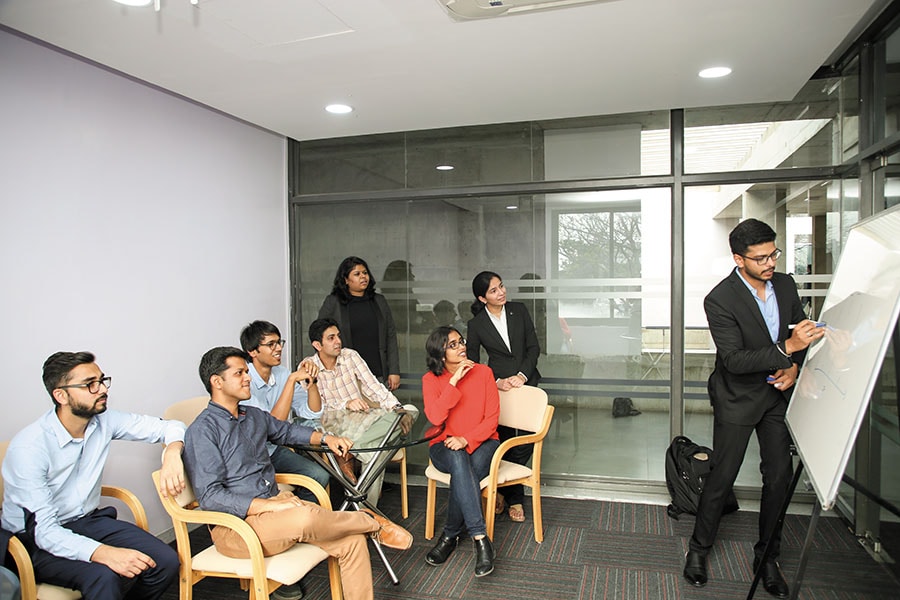We need to recognise that change is constant: IIM Bangalore Director
Despite the inclusion of technology in education and in industry, good management courses would still have programmes that focus on 'shaping the mind'


According to the recent annual application trends survey of the Graduate Management Admission Council, which conducts the GMAT, MBA applications have gone up for Asia-Pacific, Canada and European regions, while MBA colleges in the United States saw a nearly 7 percent decline. This included a 1.8 percent dip in domestic application volume and a 10.5 percent drop in international volume.
B-schools of the Asia-Pacific region, meanwhile, saw an 8.9 percent increase, while Canada realised a 7.7 percent growth and Europe saw a 3.2 percent increase in applications. Growth in the Canadian and European regions derive largely from an increase in international applications, while domestic growth is fuelling the increase in Asia-Pacific.
It should be noted that this survey, being related to more than 200 leading graduate B-schools in the world, addresses itself to higher-end management schools, at least in India.
The reduction in international applicants to the US is primarily because of its political situation, which is fuelling growth of applications into Canada and Europe.
Of course, domestic applications are also marginally declining in the US, which is both a reflection of maturity in the economy and growth being more in the technical (artificial intelligence/ machine learning) and creative domains, which is characteristic of an advanced economy.
The same premise would be valid for emerging economies in the Asia-Pacific region, where growth is still fuelled by economic activity that needs management expertise.
This accounts for the growing application pool in the better management schools in India. We should, however, keep in mind that India has the largest number of management schools for a country, with nearly 4,000 B-schools in a global count of about 12,000. This proliferation is a consequence of a liberal entry policy, where even diplomas are acceptable by the job market, given the trends set by the Indian Institutes of Managements.
However, if we take an aggregate picture of all the B-schools in India, I would believe there could be a flattening out of demand for a large number of lower-end schools. This would be a good thing since the market has a proclivity to recognising quality.
Looking at the future of management education in the Indian context, quality education would still be characterised by programmes that primarily focus on ‘shaping the mind’.Need for team work and critical thinking is far more important in emerging economies than in a mature economy. Developing an entrepreneurial and innovative mindset will also be important. In an overall sense, what is taught is less important than how it is taught.
A lot of this depends on having good quality faculty who combine research-based thought leadership with classroom-based education, investing in engaging with students.
Even in the context of the digital era, the need in emerging economies is more one of applications rather than development of technology. This calls for management-oriented senior executives with an understanding of digital technologies. While it is said that machines can take over many human roles, a human with a machine will always be superior to the machine.
The digital era requires speedy adaptation, especially if one wants to leverage the opportunities offered by the problems arising from the Indian reality. Jan Dhan, Aadhaar and mobile penetration can be key catalysts. However, we need to recognise that physical infrastructure and the human aspect of applying the technology is often a bottleneck. A good foundational management education can address these requirements in the Indian context.
The same digital era is bringing the idea of online and MOOCs-based education into management. This raises an important question as to whether such formats of delivery can replace classroom-based education. In my view, while even high-end management institutions need to keep up with technology, its penetration into delivery can be limited at best. This is because such formats can address the ‘what’ part of education better than the ‘how’ part, which is more important for shaping the mind.
I do not expect the basic model of an organisation resulting in value-adding outcomes to change even in a 10-year timeframe. The principles of marketing, based on understanding the customer and competition, would remain. The focus on operations to ensure deliveries would remain, though they could get more disaggregated across a value chain with elements of co-creation. The critical resources to ensure the deliveries would continue to be people, information and communication technology, and finances. The relative emphasis between the three resources may vary. A functional understanding of all of this would be important.
Underlying these would be a need to appreciate design thinking, digital technologies, data analytics, communication skills, not only face-to-face but also through impersonal means that span time and distance.
While the above address the ‘what’ and ‘how’ part, underlying this would be the need to ask questions around ‘why’. Who is a value-adding outcome targeted at and why? Is it adding value to society and to the quality of life? Whatever be the definition of value-addition or quality of life, why is that the definition?
Often, I hear a lot about how management education needs to keep up with a VUCA (volatile, uncertain, complex and ambiguous) world. My outlook is more conservative on this. I believe we are always in a VUCA context and hence we need to recognise that change is the constant.
There was VUCA during the expansionist and Colonial eras, there was VUCA during the World Wars, there was VUCA during India's independence, there was VUCA during liberalisation. There is nothing new about VUCA now. The world will always be VUCA and hence it is more important to develop a sense of stability to deal with this.
We need management education that will produce managers who are thoughtful, ask the right questions.
First Published: Jan 08, 2019, 17:28
Subscribe Now